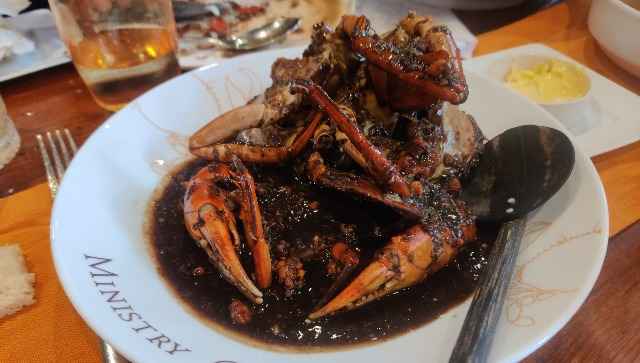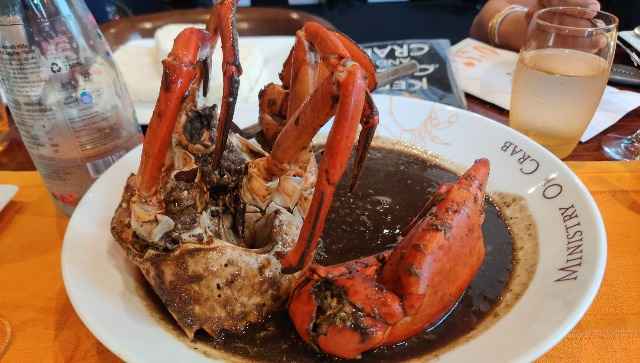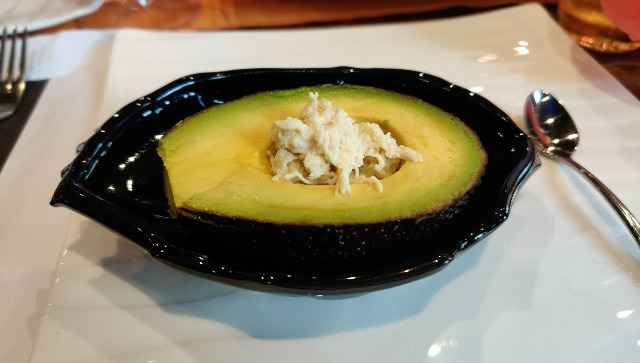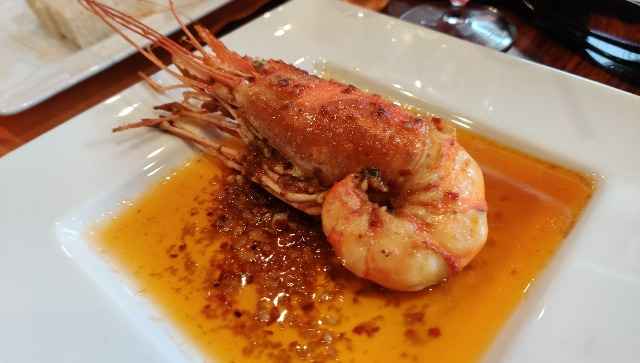It’s not every day that a celebrated chef comes into town. And when he’s travelled the distance from his country going through a lot of strife, it calls for more than a chat on food and prep in the kitchen. Over to
Dharshan Munidasa
, who has flown in from Sri Lanka to mark three years of his restaurant, Ministry of Crab
, Mumbai, which he co-owns with cricketers
Mahela Jayawardene
and
Kumar Sangakkara
. He shares a note of hope for the island nation besieged by crisis, his love for the crabs and a special message for people in India… Sri Lanka is mired in political and economic crisis; it must have affected life and work… “The crisis is something that’s man made,” starts the salt-and-pepper chef who was born in Tokyo and moved to Colombo at the age of seven. “Sri Lanka has seen its fair share of issues in the past and we have been resilient and have come out of it eventually. This one is harder because basic necessities were disappearing from shelves, fuel shortages compounded bigger problems, etc. There is a political solution in play right now and I think in in a few weeks or so, the fuel shortages will get lesser and we should be returning to normalcy. But it is going to be a difficult task to get back to normalcy fast and I think we need the support of the international community, of our neighbours for that. India is doing a lot and what we need is for people to come and visit Sri Lanka. Food, tourism and hospitality will go a long way to help the country bounce back.” He himself has just returned from a two-day trip to Bangalore where his pop-up was well received. He continues, “India is one of our biggest markets, I didn’t realise that Bangalore is just one hour away by flight from Colombo,” he says. [caption id=“attachment_10679141” align=“alignnone” width=“640”]
 Pepper Crab[/caption] How MoC came about… With a long history and unique preparation styles associated with its fragrant, coconut-blended spice curries, Sri Lanka has a culinary heritage to reckon with. Munidasa informs, “Sri Lanka has few ethnicities in a smaller space and therefore the food sees a lot of fusion. There are South Indian influences in our food on the local side, on the island we have an amazing seafood harvest, with crabs being the culinary highlight.” In fact, it was on one of the TV shows he hosted featuring the Sri Lanka Mud Crab, that the idea for creating a crab restaurant was born. He asked cricketers and his good friends Mahela Jayawardena and Kumar Sangakkara if they wanted to be part of it loved the idea. Ministry of Crab came about in 2011 in Colombo and cut to date, there are seven outlets in Colombo, Shanghai, Chengdu, Manila, Mumbai, Maldives, and Bangkok. [caption id=“attachment_10679181” align=“alignnone” width=“640”]
Pepper Crab[/caption] How MoC came about… With a long history and unique preparation styles associated with its fragrant, coconut-blended spice curries, Sri Lanka has a culinary heritage to reckon with. Munidasa informs, “Sri Lanka has few ethnicities in a smaller space and therefore the food sees a lot of fusion. There are South Indian influences in our food on the local side, on the island we have an amazing seafood harvest, with crabs being the culinary highlight.” In fact, it was on one of the TV shows he hosted featuring the Sri Lanka Mud Crab, that the idea for creating a crab restaurant was born. He asked cricketers and his good friends Mahela Jayawardena and Kumar Sangakkara if they wanted to be part of it loved the idea. Ministry of Crab came about in 2011 in Colombo and cut to date, there are seven outlets in Colombo, Shanghai, Chengdu, Manila, Mumbai, Maldives, and Bangkok. [caption id=“attachment_10679181” align=“alignnone” width=“640”]
 Garlic Chilli Crab[/caption] ‘Food binds people and cultures, you don’t need a language to understand it’ Settled in the three-level eatery at Khar in Mumbai, which opened in 2019, when MOC was brought down to India by Ramit Mittal of Gourmet Investments Private Ltd, the meal is akin to an experience. I use that word because relishing the mud crab brings about that. “It’s theatrical almost,” says the chef. “I definitely feel food brings people together, it binds cultures together. You don’t need a language to understand it, it’s simple as someone enjoying it.” Everything is fresh and cooked to order as the restaurant has a no-refrigerator rule. You break into the meat with your hands helped by crab knife and claw cracker and allow just the flavours to take over, dipping the Sri Lankan wood fire-bread, kade, ever so often into the flavoursome stock. A must-try is the Garlic Chili Crab that uses a variety of chillies for flavour and the Pepper Crab, where hand-crushed peppercorn and pepper stock adds delicious flavour to the crustacean. [caption id=“attachment_10679171” align=“alignnone” width=“640”]
Garlic Chilli Crab[/caption] ‘Food binds people and cultures, you don’t need a language to understand it’ Settled in the three-level eatery at Khar in Mumbai, which opened in 2019, when MOC was brought down to India by Ramit Mittal of Gourmet Investments Private Ltd, the meal is akin to an experience. I use that word because relishing the mud crab brings about that. “It’s theatrical almost,” says the chef. “I definitely feel food brings people together, it binds cultures together. You don’t need a language to understand it, it’s simple as someone enjoying it.” Everything is fresh and cooked to order as the restaurant has a no-refrigerator rule. You break into the meat with your hands helped by crab knife and claw cracker and allow just the flavours to take over, dipping the Sri Lankan wood fire-bread, kade, ever so often into the flavoursome stock. A must-try is the Garlic Chili Crab that uses a variety of chillies for flavour and the Pepper Crab, where hand-crushed peppercorn and pepper stock adds delicious flavour to the crustacean. [caption id=“attachment_10679171” align=“alignnone” width=“640”]
 Avocado Crab Salad[/caption] While the cooking and plating takes from the Japanese food philosophy, Munidasa has another firm mantra – minimising food miles. He explains, “Ingredients are key to restaurants. I believe restaurants are not just about importing stuff from another country or contributing towards global warming etc, I think food miles are crucial and we are quite good at reducing those. I have said this before - the best crabs that are caught in Sri Lanka should be eaten in Sri Lanka and the same for India, the best crabs of India should be plated up in India. Why should we have the second best of another country in or own country?” ‘Everything that I have done has been about my learning experiences from the past’ For this graduate with a double degree from John Hopkins University who went on found his Japanese restaurant Nihonbashi and Ministry of Crab – both of which have made it to Asia’s 50 Best list - the path is paved with learnings. He admits, “The journey was never planned to be like this. It has been an evolutionary process, there have been lessons every day with learning new things. Sri Lankan crabs are very famous in Singapore and to get the same crab, you need to pay the same price as Singapore pays, in Sri Lanka. I found the same situation in India. I began to think of how to get the export of this prized crustacean back. The value for them has shot up, too. Forty years ago, these crabs were transported in cane baskets and now, they’re going in neat Styrofoam boxes. Through my Japanese restaurant, I also learnt from the crab mongers how to grade and choose crabs, etc… so everything that I have done has been about learning experiences from the past. And experience is nothing without memory, it you do not remember those experiences and take it forward, it won’t be of any use, so it’s important to remember and reflect.” [caption id=“attachment_10679161” align=“alignnone” width=“640”]
Avocado Crab Salad[/caption] While the cooking and plating takes from the Japanese food philosophy, Munidasa has another firm mantra – minimising food miles. He explains, “Ingredients are key to restaurants. I believe restaurants are not just about importing stuff from another country or contributing towards global warming etc, I think food miles are crucial and we are quite good at reducing those. I have said this before - the best crabs that are caught in Sri Lanka should be eaten in Sri Lanka and the same for India, the best crabs of India should be plated up in India. Why should we have the second best of another country in or own country?” ‘Everything that I have done has been about my learning experiences from the past’ For this graduate with a double degree from John Hopkins University who went on found his Japanese restaurant Nihonbashi and Ministry of Crab – both of which have made it to Asia’s 50 Best list - the path is paved with learnings. He admits, “The journey was never planned to be like this. It has been an evolutionary process, there have been lessons every day with learning new things. Sri Lankan crabs are very famous in Singapore and to get the same crab, you need to pay the same price as Singapore pays, in Sri Lanka. I found the same situation in India. I began to think of how to get the export of this prized crustacean back. The value for them has shot up, too. Forty years ago, these crabs were transported in cane baskets and now, they’re going in neat Styrofoam boxes. Through my Japanese restaurant, I also learnt from the crab mongers how to grade and choose crabs, etc… so everything that I have done has been about learning experiences from the past. And experience is nothing without memory, it you do not remember those experiences and take it forward, it won’t be of any use, so it’s important to remember and reflect.” [caption id=“attachment_10679161” align=“alignnone” width=“640”]
 Garlic Chilly Prawn[/caption] ‘The handling of fish could improve at Sassoon Dock, that way you could get a better product’ Unlike his compatriots, this chef is not someone who is out at first light at the market, and there’s a reason why. He says, “The good seafood of our countries is exported out. Although they can be caught early morning, it comes to a collection centre and from there to a place where it gets processed for export. That’s where the selection process happens. Most of the times, these places operate on flight schedules, so it’s not early morning, but late afternoon that I need to go there. That said, I do go to the local fishing villages around Colombo in the morning when I have to find something new, when I have to make special dinner or just when I need inspiration.”
Garlic Chilly Prawn[/caption] ‘The handling of fish could improve at Sassoon Dock, that way you could get a better product’ Unlike his compatriots, this chef is not someone who is out at first light at the market, and there’s a reason why. He says, “The good seafood of our countries is exported out. Although they can be caught early morning, it comes to a collection centre and from there to a place where it gets processed for export. That’s where the selection process happens. Most of the times, these places operate on flight schedules, so it’s not early morning, but late afternoon that I need to go there. That said, I do go to the local fishing villages around Colombo in the morning when I have to find something new, when I have to make special dinner or just when I need inspiration.”
Ismat Tahseen is a Mumbai-based journalist who writes on food, trends, culture and lifestyle for over a decade now.
Read all the Latest News _,_ Trending News _,_ Cricket News _,_ Bollywood News _,_ India News and Entertainment News here. Follow us on Facebook _,_ Twitter and Instagram _._
)